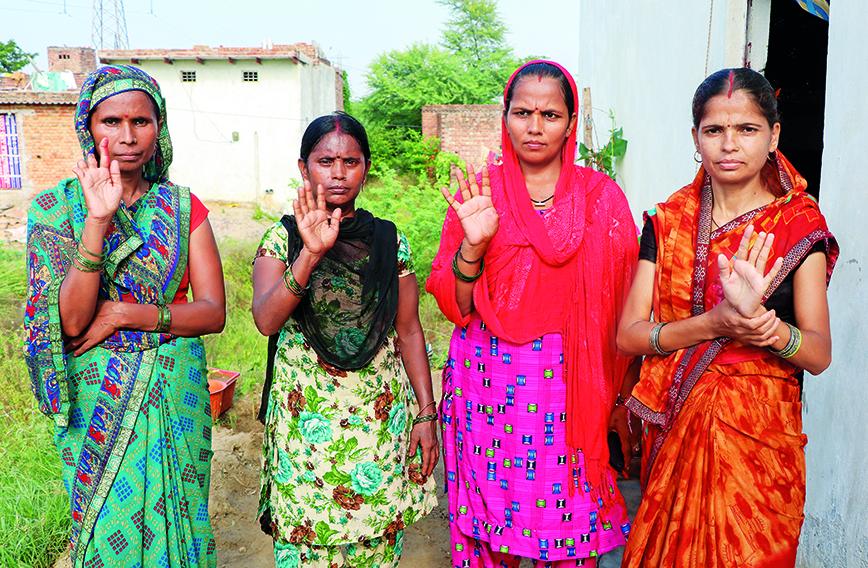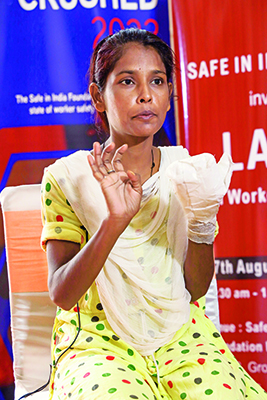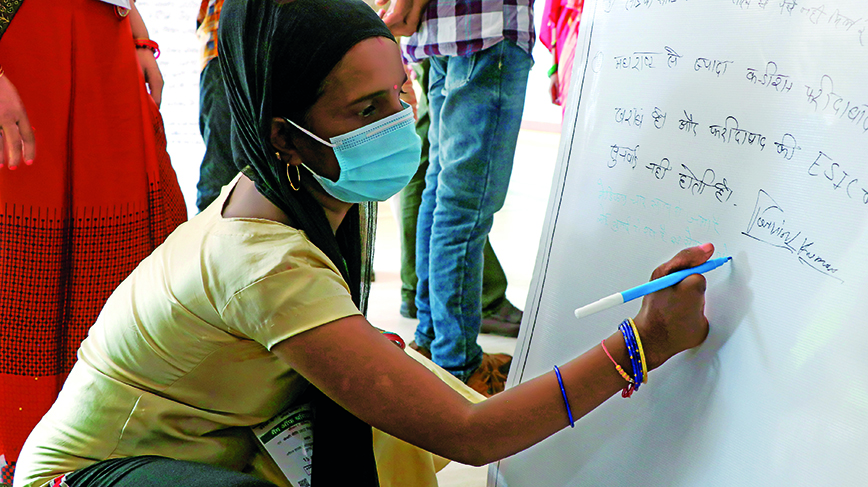
Women in the pictures above and below are among the increasing number who experience shopfloor accidents
Crushed hopes of women workers in the auto sector
Kavita Charanji, Gurugram
NEETU Devi lost her hand a year and a half ago in a factory accident. Her hand was crushed by a malfunctioning power press machine in a company that manufactures auto components for Maruti Suzuki in Gurugram. The accident was inevitable. The power press was defective and despite her complaints to her supervisor, she was compelled to continue working.
Today she is in the Labour Court, fighting for reparation from the company. She now waters plants, mans the gates and does similar menial jobs for the factory owners. Nothing can soothe her anguish. “I am like prey for a ravenous tiger,” says Neetu.
Safe In India (SII) Foundation’s fifth annual report, CRUSHED, highlights a worrying trend. More and more migrant women are joining the supply chain of the auto components sector, and suffering injuries on the job.
Originally from Lakhimpur Kheri in Uttar Pradesh (UP), Neetu — who is illiterate —looked for employment everywhere. When a contractor in Gurugram offered her a job in an auto components factory, she grabbed it.
 Her dream of a better life for her family now lies shattered. The factory manager took her to an Employees’ State Insurance (ESI) hospital in the locality. Later she was referred to a private hospital. After much running around, she managed to get Rs 23,000 from the Employees’ State Insurance Corporation (ESIC) in lieu of her leave and a monthly pension of Rs 7,000.
Her dream of a better life for her family now lies shattered. The factory manager took her to an Employees’ State Insurance (ESI) hospital in the locality. Later she was referred to a private hospital. After much running around, she managed to get Rs 23,000 from the Employees’ State Insurance Corporation (ESIC) in lieu of her leave and a monthly pension of Rs 7,000.
The company where she works has not given her even a rupee by way of compensation, she says angrily. She gets a monthly salary of Rs 12,350 on which she supports her two sons who have studied up to Class 10. Her daughter is married. “I don’t know how I will survive without a hand. I am like a sinking ship,” says Neetu.
The SII report presents data pertaining to injuries suffered by workers in the supply chain of auto sector brands from Haryana, Maharashtra, Uttarakhand, Rajasthan, Tamil Nadu and Karnataka.
With a special focus on women workers in the auto sector, CRUSHED is a searing indictment of the various stakeholders in the sector, be it the government or industry. Workers are blatantly exploited by auto components manufacturers. The government, on its part, turns a blind eye to lapses in safety checks, under-reporting injury statistics and ignoring loopholes in labour laws.
There is complete absence of concerted national-level action by auto bigwigs or their umbrella bodies. There is also lack of public awareness about the issue and glaring lacunae all around that needs to be addressed.

Though women are joining the automobile supply chain in increasing numbers, they appear to be in a far more precarious position pre- and post-injury than their male counterparts, according to the CRUSHED report. A focus group discussion held by SII with 22 injured women workers operating power press machines in the auto hub of Faridabad in Haryana, revealed a high degree of exploitation by employers.
Injured women workers say that more women are employed as power press operators than men. Though they are believed to be more productive and efficient, they get lower wages.
Straitened economic circumstances drive women to work in unsafe auto components manufacturing units. Many of them are migrants. The lack of viable options in their vicinity makes a factory job look attractive. They initially take on jobs as packers or helpers but are tempted into work on a power press machine by the offer of an extra monthly `1,000-1,500. They might also be ordered to do so by their supervisors when there is a shortfall of operators or production pressures are high, says the report.
While men too face many obstacles in getting ESIC benefits post-injury, the situation is far worse for women. They said they had to depend on a male companion to get ESI services and the required documentation from employers. Many are fired from their jobs post-accident or are compelled to scout around for other employment opportunities.
That is a big blow for women, many of whom are single or widows, says Masab Shamsi, operations head, SII Worker Assistance Centres that are spread out in the auto hubs of Manesar, Faridabad, Gurugram and Pune.
With serious crush injuries, they cannot carry out simple housework tasks, he says. “I can’t even cook. I depend on people to cook for me,” says 23-year-old Mamta Kumari, a migrant worker from a village in Jharkhand who lost her finger on a power press in a Manesar-based factory a few months ago.
Even as she waits for her medical treatment to be over so that she can get her ESI post-injury compensation, she is not hopeful about her future. “The company said they would not give me even one paisa,” she says. Her mother and father are agricultural workers so they are not in a position to help out. Her hopes are pinned on finding jobs like stitching in the garments sector.
There are other problems. V.N. Saroja, senior adviser to SII, cites the case of Maruti Suzuki which installed safety equipment in some of its Tier 2 and Tier 3 factories three years ago. A year later, SII found that some of the factories had uninstalled the equipment because of high production pressures.
CRUSHED notes that there is a clear “lack of professionalism” in a large part of the auto sector supply chain. Contravention of the law is apparent right from the process of “hiring workers who do not meet the defined qualifications by education/gender and then make them operate on poorly maintained machinery with barely any training or safety equipment”.
SII has demanded affirmative action by both government organizations and Original Equipment Manufacturers (OEMs) that rake in the gains of products made under substandard work conditions. “Profits and margins cannot rest on the exploitation of individuals who are desperate to just survive,” says the scathing report.
Comments
Currently there are no Comments. Be first to write a comment!



